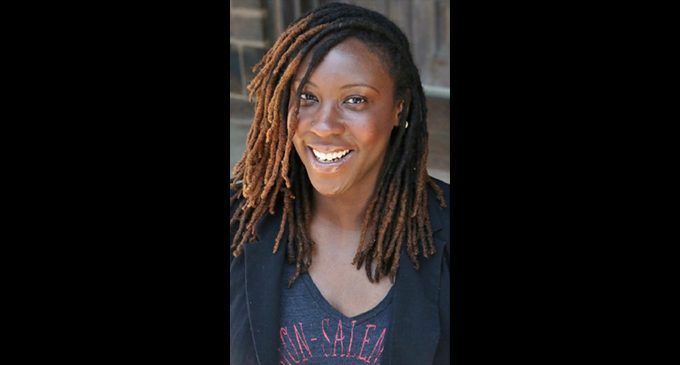Commentary: Equality, equity: Leveling the playing field for black students
Charity Brown Griffin

By Charity Brown Griffin
Recently, Winston-Salem/Forsyth County Schools (WSFCS) removed the principals of four underperforming elementary schools – and reassigned six other principals to these schools plus two other struggling elementary schools. According to WSFCS, these six veteran principals were shifted from their former posts because they have a track record of “growing students.”
Whether you believe these changes were good, bad or are unsure, one thing is for certain: Change was needed. These shifts in school leadership demand we have a larger discussion about equality and equity, and how acknowledging the distinction between these concepts is important for student success in WSFCS.
So, what’s the difference between equality and equity?
When teaching about these concepts in class, I often use a commonly provided practical example: Think for a moment about runners sprinting around an oval track during a competition. The concept of equality would have us treat the runners in exactly the same way, ensuring that they all start at the same place on the track. Though on the surface, this seems fair, we know that runners in the inside lanes have a distinct advantage over runners in the outer lanes because the distance they have to travel is shorter. Therefore, equality, the same starting place, doesn’t result in fairness. In contrast, if our behavior is guided by equity, we would stagger the starting positions of the runners in order to offset the disadvantages facing those in the outer lanes. From this example, we can more easily understand how equity recognizes differences and provides tailored treatment in an attempt to counteract unequal individual opportunities.
Educational spaces that center equality treat all students the same way, without giving weight to individual needs. Though foundational to granting rights and opportunities, ensuring everyone has the same is not the end post we currently need to be seeking. WSFCS, like the majority of school systems around our nation, must first strive for equity. Similar to the example used above, educational spaces that center equity ensure that students are provided the resources they need to have access to the same opportunities.
The science is clear and shows that all students do not experience school in the same way. In my own research over the past several years, I have come to understand that black students, in particular, have unique experiences because they are required to navigate schools that systematically reproduce inequity as a result of racism.
WSFCS is not immune to systemic inequity. Using funding from the Center for the Study of Economic Mobility at Winston-Salem State University, this past summer my undergraduate students and I developed and implemented a research-based summer program we called, YouthRISE. Our program sought to empower youth to become community change agents and gain insight into their perceptions of opportunities and barriers to economic mobility – an important topic given that Forsyth County ranks as the third poorest county in the U.S. for upward economic mobility. The program involved 11 black youth in grades 8-12 who were residing in East Winston-Salem. Our research team found that, while these youth perceived education to be critical for improving their economic opportunity, they experienced unfair treatment within the education system, which presented barriers. These students spoke boldly about depleted infrastructure, lack of technology equipment, the high number of long-term substitutes who did not engage them with the curriculum, large class sizes, and teacher perceptions of incompetency due to their race, as key issues in their Title 1 (or low-income) schools. Most notably, these students shared that they fully recognized these as observations from their own school spaces, but that “other high schools” located on a “different side of town” do not have these same “issues” because they have “more money.”
Given the evidence from national and local research, it is clear that centering equity, rather than equality alone, is critical for creating opportunities for students to succeed in WSFCS. Assigning new leadership to these six underperforming schools was a critical step in improving equity, as each school’s achievement data clearly indicate that there are unique needs in these buildings that are thwarting student success. Nonetheless, this step is likely insufficient, and more radical changes that intentionally agitate the status quo will be required to redress existing disparities.
Such changes might include widening access to high quality, early childhood education programs; eliminating de facto (i.e., by personal preference) and de jure (i.e., resulting from racially-motivated public policy) racial and economic segregation; allocating resources for increasing the capacity of teachers to deliver evidence-based, gap-closing instructional and learning strategies; and informing educators on how culture, identity and context interact and building on the cultural assets that black students bring with them to the classroom. Ultimately, WSFCS must work collaboratively with local government, businesses, and community stakeholders, to improve the social and economic conditions of the communities surrounding underperforming schools.
Under the leadership of newly appointed superintendent Angela Pringle, optimistic changes are happening. However, I hope WSFCS will aggressively push forward to disrupt oppressive systems that are breeding inequalities, by prioritizing equity so that all students, and not just those attending certain schools, have an equal opportunity to attain their maximum potential.
Charity Brown Griffin is an assistant professor in the Department of Psychological Sciences at Winston-Salem State University and a 2018-2019 fellow at the school’s Center for the Study of Economic Mobility.















